
Warning: this post contains graphic details that may be upsetting to some readers.
While parents can often be divided on the topic of circumcision, one side we don’t often hear is that of the medical staff who perform them.
Registered nurse Emma* worked in a public circumcision clinic for three months in the early 1990s, assisting midwives and doctors as they carried out the procedure on dozens of babies.
“The parents would arrive at the clinic nervously cradling their tiny babies,” Emma tells Mamamia.
“They had signed consent forms and applied some EMLA numbing cream to their child’s penis. They had to hand their precious son over to me and I would carry them into theatre.”
As the most junior member of the team, Emma was charged with physically restraining the babies during the procedure, which she understandably found very challenging.
“I would have to unwrap the baby and remove their nappy prior to the circumcision. The babies were cold and vulnerable; immediately they would start to fight against me.
Sean Szeps shares how he explains genitalia to his kids on our podcast, The Baby Bubble:
“I am not a big person but I would have to place my hands over their thighs and my forearms on top of their arms to hold them still. My face would be close to theirs and I could see and feel their reaction up close.”
While Emma held each baby as gently but firmly as possible, the doctor placed a plastic device over the baby’s penis and then withdrew the foreskin over the top. A ligature would be tied around it to stop the blood flow and then the doctor would use a scalpel to remove the foreskin.



Top Comments
Two points to add to this discussion :
Circumcision is surgery and the medical definition of surgery (other that optional cosmetic surgery) is to repair damage caused by disease or injury. We are all designed by nature to have foreskins, therefore presence of foreskin equates to neither disease nor injury. To still perform surgery on perfectly healthy and normal little boys is medically unethical and becomes unlawful maiming.
The argument that babies feel no pain or, at least, won’t remember it, therefore it’s ok to circumcise them, is as ridiculous as saying: As long as the girl is sufficiently drunk on the date so as not to be able to remember it, then it’s ok to rape her. Obviously date-rape is wrong whether she can remember the event or not. Underage circumcision is just as wrong and must stop.
What a great article! What a great insight to this silly ritual...yet it’s left up to the parents to decide...why not leave it up to the boys themselves when they are mature enough at age 18? Of course...money for the GP’s who love doing it!